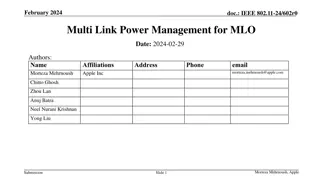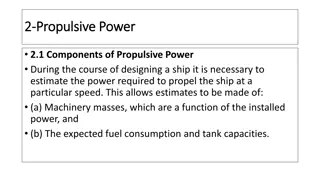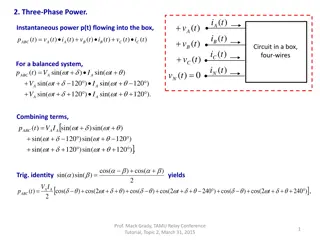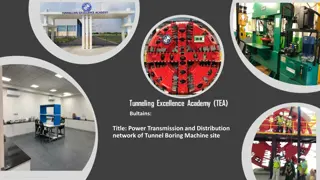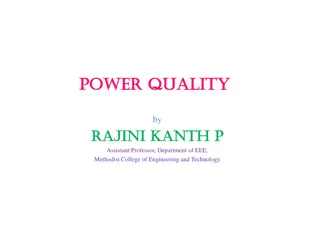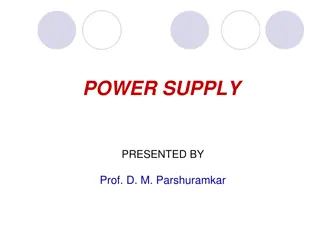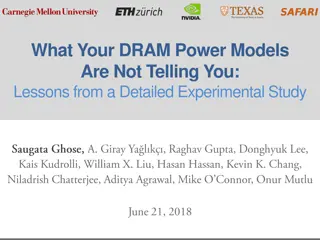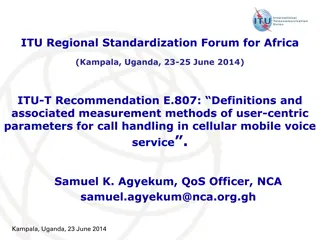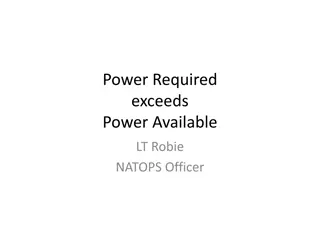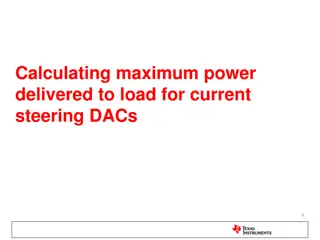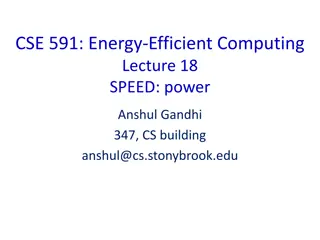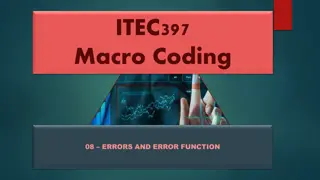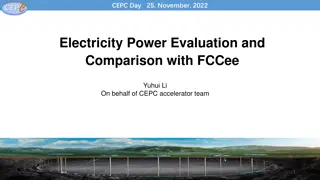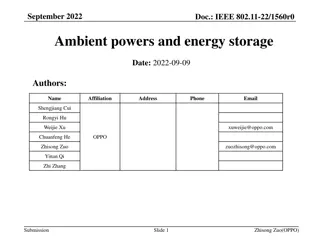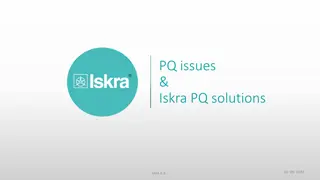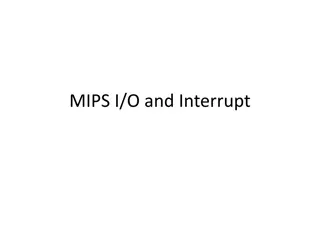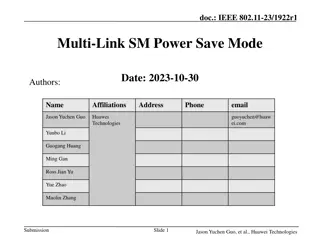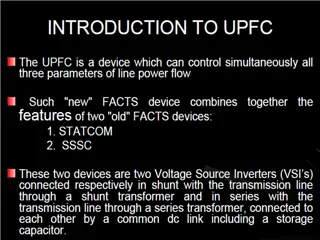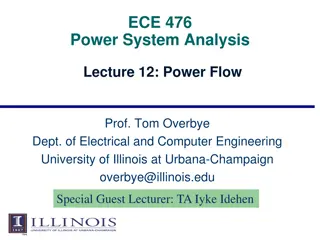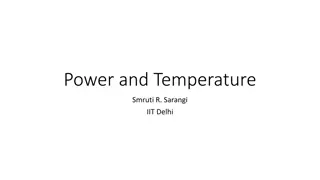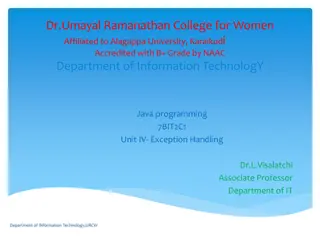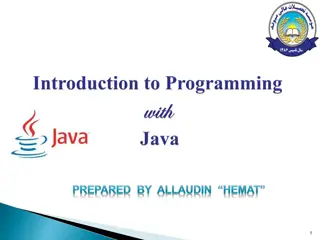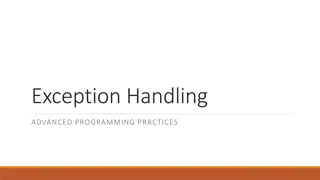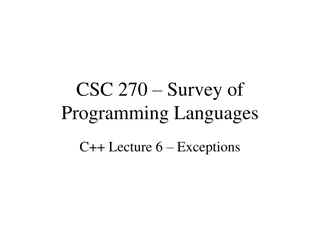Cisco Systems Fault Managed Power Portfolio Overview
Cisco Systems offers an industry-leading Fault Managed Power (FMP) patent portfolio comprising 24 active assets across seven INPADOC families. The portfolio includes patents supporting fault-managed power systems, PoE deployments, DC power distribution, DC-DC conversion, and HVDC connectors. The FMP
4 views • 4 slides
Power Distribution in Data Centers Overview
Power distribution and equipment play crucial roles in commercial data center infrastructure, ensuring reliable and efficient operations. Adequate power routing from the grid or generators to data center equipment is vital for stable operations, data integrity, and performance maintenance. This incl
4 views • 19 slides
Advanced Data Handling Architecture (ADHA): Status, Current Activities and Industrial Road Map
The Advanced Data Handling Architecture (ADHA) program aims to deliver a new generation of Platform and Payload Data Handling units by 2025, utilizing standardized, interoperable modules from various suppliers. The program targets significant improvements in spacecraft development time, cost efficie
0 views • 18 slides
Great Power Rivalry in World Politics: Understanding Polarity, Balance of Power, and Hegemonic Transition
Great power rivalry involves deep competition and hostility between major players like the US, China, and Russia. The concept is explored through polarity, balance of power, and hegemonic transition theories, discussing power distribution, strategies, and transitions in the international system. The
4 views • 12 slides
Improving Multi-Link Power Management Efficiency in IEEE 802.11 Networks
The document discusses challenges with per-link power mode changes in multi-link scenarios in IEEE 802.11 networks, proposing a solution for more efficient power management. It addresses issues such as latency and inefficiencies in signaling for power mode changes, introducing scheduled multi-link p
6 views • 9 slides
Understanding Power Transfer and Impedance Matching in Circuits
Exploring the concept of maximizing power transfer between a source and load through impedance matching. Learn about complex conjugates, real and magnitude of complex numbers, average power in circuits, and the importance of minimizing reflected power. Discover how incident, reflected, and delivered
3 views • 33 slides
Understanding Ship Propulsion Power Estimation
In the process of ship design, it is crucial to estimate the power required for propulsion to determine machinery masses, fuel consumption, and tank capacities. Power estimates can be derived through comparisons with existing vessels or model tests, involving scaling laws for different components. S
0 views • 19 slides
Small Animal Restraints and Safe Handling Practices in Veterinary Technology
Importance of safe practice when working with small animals includes preventing harm, reducing injury, and minimizing stress. Proper animal handling methods and tools are crucial for the safety of both animals and handlers. Common methods of handling different species, demonstrating appropriate anim
1 views • 22 slides
Overview of Farm Power Sources and Utilization in Agriculture
Farm power sources in agriculture include human, animal, mechanical, and renewable energy. Human power is costly but versatile, while animal power is traditional and provides manure. Mechanical power from tractors and engines is efficient. India's farm power sources reflect a mix of traditional and
0 views • 12 slides
Understanding Three-Phase Power Systems and Instantaneous Power Flow
This detailed content delves into three-phase power systems, analyzing instantaneous power flow, balanced circuits, and trigonometric calculations. It explores the concept of constant three-phase power and provides insights into the analogy of a piston engine with infinite cylinders. The data includ
2 views • 9 slides
Power Transmission and Distribution Network of Tunnel Boring Machine Site
The power transmission and distribution network at the tunnel boring machine (TBM) site involves electrical motors, generators, transformers, and power cables to efficiently operate TBMs for tunnel construction. The system includes multiple generators, transformers, junction boxes, and power distrib
1 views • 7 slides
Understanding Thermal Power Plants: Overview and Operation
Thermal power plants play a crucial role in converting heat energy into electricity for various applications. This article covers the definition, layout, working principle, and components of thermal power plants, highlighting their advantages and top features. From converting heat into mechanical po
0 views • 20 slides
Best Practices for Cash Handling and Receipt Management
Enhance your cash handling and receipt management practices with essential guidelines such as separation of duties, internal controls, and proper handling of funds and transactions. Discover key insights on authorized departments, standards for receipts and funds handling, and ways to share responsi
1 views • 43 slides
Understanding Power Quality and Its Impact on Electrical Systems
Power quality refers to the characteristics of electrical power that drives sensitive equipment. It involves voltage and current deviations from ideal waveforms, impacting the efficiency and reliability of electrical systems. Various types of power quality phenomena exist, such as voltage variations
1 views • 16 slides
Understanding Power Supplies and Rectifiers in Electrical Systems
Power supplies play a crucial role in converting AC power to DC power, with two main types being unregulated and regulated. Regulated power supplies consist of essential components like a step-down transformer, full-wave rectifier, filter circuit, and voltage-regulating circuit. Rectifiers are devic
0 views • 25 slides
Cash Handling Training Certification Overview
This overview provides information on cash handling training certification for satellite cashiers and occasional cash handlers at CSU. It covers the purpose of the training, responsibilities of cash handling locations, training requirements, and physical security protocols for handling university ca
3 views • 27 slides
Manual Handling Toolbox Talk - Importance and Prevention of Injuries
Manual handling injuries are a prevalent issue in workplaces, leading to significant work-related musculoskeletal disorders. Employers must assess and mitigate risks associated with manual handling to ensure employee safety and well-being. Employees also have responsibilities to follow safety protoc
0 views • 16 slides
Insights into DRAM Power Consumption and Design Concerns
Detailed experimental study reveals that DRAM power models may not provide accurate insights into power consumption. The increasing importance of managing DRAM power in system design is emphasized. The study delves into DRAM organization, operation, and power consumption patterns, highlighting the n
0 views • 43 slides
User-Centric Parameters for Call Handling in Cellular Mobile Voice Service
The ITU Regional Standardization Forum for Africa held in Kampala, Uganda in June 2014 introduced ITU-T Recommendation E.807, focusing on the definitions and measurement methods of user-centric parameters for call handling in cellular mobile voice service. The recommendation outlines five key parame
1 views • 15 slides
Helicopter Power Management Guidelines
Understanding the factors that can lead to power required exceeding power available in a helicopter is crucial for safe operation. Indications such as uncommanded descent, rotor droop, loss of tail rotor authority, and right yaw signal potential issues to watch out for. Knowing when such occurrences
0 views • 11 slides
Calculating Maximum Power Delivery to Load in Current Steering DACs
In the process of calculating the maximum power delivered to the load for current steering DACs, several steps are involved, such as determining the peak-to-peak voltage at the DAC output, converting it to RMS voltage, calculating power delivered to the load, and converting power to dBm. Examples wi
0 views • 5 slides
Exploring Power Efficiency in Computing Systems
In this lecture series on energy-efficient computing, various concepts related to dynamic frequency scaling, power capping, power shifting, power modeling, and power measurement are discussed. The impact of power on server speed is explored, alongside strategies for improving performance within powe
0 views • 17 slides
Understanding Error Handling Techniques in VBA Programming
Error handling is crucial in VBA programming to catch and manage runtime errors effectively. This article explores various error handling techniques such as On Error GoTo statement to prevent program crashes and enhance the reliability of applications. By using structured error handling, developers
0 views • 17 slides
Comparison of Electricity Power Systems Between CEPC and FCCee
The evaluation and comparison of electricity power systems between the CEPC and FCCee accelerators reveal the power breakdowns, RF power consumption, magnet power supply, and overall power usage. Differences in power consumption for various components such as RF, magnets, and vacuum systems are high
0 views • 19 slides
Ambient Power Harvesting Technologies Overview
This document discusses various ambient power harvesting technologies such as RF energy, solar power, light, and thermal energy. RF-based energy harvesting utilizes radio waves for power transmission with potential applications in logistics, smart homes, and environmental monitoring. Solar power off
0 views • 12 slides
Power Quality Monitoring and Evaluation in Modern Energy Systems
Power quality is crucial for stable operations in energy systems. This content discusses issues in power supply, reasons for measuring power quality, consequences of bad power quality, methods for measuring power quality, and evaluation techniques for compliance reports. Tracking power quality param
0 views • 21 slides
Understanding MIPS I/O and Interrupt Handling
Delve into the world of MIPS architecture, exploring how I/O operations and interrupts are managed. Learn about memory organization, system functions, I/O registers, and kernel data. Discover how SPIM facilitates input and output handling, including reading from the keyboard and managing output. Div
0 views • 18 slides
Power Dynamics in the Hellenistic World: A Study of Olympias of Macedon
Exploration of power dynamics in the Hellenistic world through the multidimensional exercise of power by Olympias of Macedon. The study delves into various forms of power such as reward, coercive, legitimate, referent, and expert power, shedding light on their roles in shaping leadership and influen
0 views • 20 slides
Enhancing Power Efficiency in IEEE 802.11 Multi-Link SM Power Save Mode
The document discusses how Multi-Link Operation (MLO) in IEEE 802.11be can improve throughput and reduce latency but may increase power consumption for non-AP devices. It introduces the concept of Multi-Link SM Power Save mode to optimize power usage by activating multiple links only when necessary,
0 views • 10 slides
Effective Cash Handling Training Presentation
This training presentation focuses on the principles of good cash handling, types of deposits, and adherence to cash handling policies. It highlights the importance of accountability, outlines what is included in cash handling, and discusses the risks associated with cash handling. The presentation
0 views • 27 slides
Understanding Power Consumption in Memory-Intensive Databases
This collection of research delves into the power challenges faced by memory-intensive databases (MMDBs) and explores strategies for reducing DRAM power draw. Topics covered include the impact of hardware features on power consumption, experimental setups for analyzing power breakdown, and the effec
0 views • 13 slides
Overview of Unified Power Flow Controller (UPFC) in Power Systems
A Unified Power Flow Controller (UPFC) is a combination of a Static Synchronous Compensator (STATCOM) and a Static Synchronous Series Compensator (SSSC) interconnected via a common DC link. UPFC allows bidirectional flow of real power and provides concurrent real and reactive series line compensatio
0 views • 20 slides
Understanding Leadership and Power Dynamics
Power and leadership are interconnected concepts, with power being the measure of a person's ability to influence others. Leaders have power in various situations, but it does not necessarily mean having power over people. Effective leaders balance their use of power with knowledge and trust, knowin
0 views • 9 slides
Discussion on Sustainable Energy Solutions and Efficiency Improvements in Thermal Power Plants
The 20th India Power Forum held on 22nd November 2017 highlighted the importance of sustainability in the power business, focusing on the paradigm shift towards 24x7 power for all. Topics included decommissioning thermal power plants for more efficient and cleaner units, with insights from industry
0 views • 16 slides
Power System Analysis: Lecture on Power Flow
Lecture 12 on Power Flow Analysis in Power Systems covers the use of power balance equations when analyzing complex power consumption and generation. It explains the derivation of real power balance equations for iterative solutions in power flow analysis. The lecture highlights the need for iterati
0 views • 30 slides
Understanding Power Consumption and Temperature in Electronic Circuits
Explore the significance of power consumption in electronic circuits, focusing on reasons for high power, high temperature, and low reliability. Learn about sources of power consumption, types of power dissipation, dynamic power analysis, and the relationship between energy and power in circuits.
0 views • 30 slides
Exception Handling in Java: Basics, Examples, and Importance
Understanding the concept of exception handling in Java, including what exceptions are, the difference between errors and exceptions, reasons for exceptions, how to handle them, and the advantages of exception handling. This topic covers the basics of handling runtime errors in Java programming and
0 views • 27 slides
Understanding Exception Handling in Java
Exception handling in Java is a crucial mechanism to manage runtime errors effectively. This article explains the concept of exceptions, advantages of using exception handling, types of exceptions (checked, unchecked, and errors), common scenarios like ArithmeticException and NullPointerException, a
0 views • 23 slides
Understanding Exception Handling in Java Programming
Exception handling in Java is a crucial mechanism to manage runtime errors effectively. This process helps maintain the normal flow of an application, separates error-handling code from regular code, propagates errors up the call stack, and groups error types. By handling exceptions, developers can
0 views • 11 slides
Overview of Exception Handling in C++ Programming
This content provides insights into exception handling in C++ programming, specifically comparing it to Java. It covers the differences in exception handling between C++ and Java, such as the absence of null pointer exceptions and divide-by-zero exceptions in C++. It explains how C++ deals with exce
0 views • 13 slides




